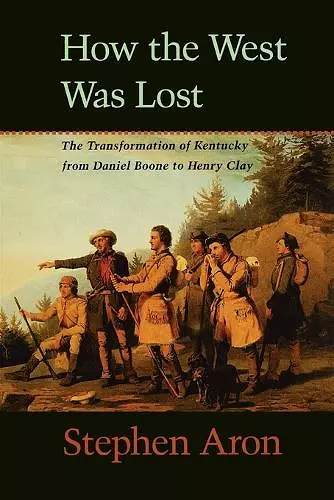How the West Was Lost
The Transformation of Kentucky From Daniel Boone to Henry Clay
Format:Paperback
Publisher:Johns Hopkins University Press
Published:19th Mar '99
Currently unavailable, and unfortunately no date known when it will be back

A first-rate piece of work and a fine read. -- Alan Taylor, University of California, Davis This excellent history of early Kentucky resonates with the most important questions in the history of the early republic, frontier, and economic development. One of the book's great strengths is its 'genre-busting' quality, taking up ethnohistory and settlement history in the same narrative. -- John Mack Faragher,, Yale University
Seeking to explain why these dreams were not realized, Stephen Aron shows us what did happen during Kentucky's tumultuous passage from Daniel Boone's world to Henry Clay's.Eighteenth-century Kentucky was a place where Indian and European cultures collided-and, surprisingly, coincided. But this mixed world did not last, and it eventually gave way to nineteenth-century commercial and industrial development. How the West Was Lost tracks the overlapping conquest, colonization, and consolidation of the trans-Appalachian frontier. Not a story of paradise lost, this is a book about possibilities lost. It focuses on the common ground between Indians and backcountry settlers which was not found, the frontier customs that were not perpetuated, the lands that were not distributed equally, the slaves who were not emancipated, the agrarian democracy that was not achieved, and the millennium that did not arrive. Seeking to explain why these dreams were not realized, Stephen Aron shows us what did happen during Kentucky's tumultuous passage from Daniel Boone's world to Henry Clay's.
The publication of How the West was Lost moves Stephen Aron, currently a professor at UCLA, into the front ranks of contemporary American historians. The book shatters customary generic boundaries to incorporate insights from many types of history-social, political, economic, ethnohistory, women's history, religious history, even the 'new' western history. Though the ground has been covered before, no one prior to Aron has so thoroughly and insightfully examined the range of complex issues involved in the development of Kentucky from frontier to settlement... How the West was Lost is an insightful and accessible book, one that should have an appeal beyond the professional historian. A brief review does scant justice to the subtlety and thoroughness with which Aron details the mentalities and motivations of the historical actors in the drama of Kentucky settlement. -- Charles B. Churchill History: Reviews of New Books Stephen Aron has written a masterly account of the settlement and development of Kentucky from the late eighteenth century through the early nineteenth. Aron chooses as his parameters the overlapping lives of two archetypal Kentuckians, Daniel Boone and Henry Clay... Although each frontier was unique in circumstances, Kentucky's transition from backcountry to settlement and elite dominance was a common pattern. This excellent book will be useful to all interested in the frontier and the nineteenth century, not just to those interested in Kentucky or the Ohio Valley. -- Nicole Etcheson Journal of the Early Republic This is an excellent study-well written, well researched, and well argued. In the area of frontier history, there should be a buzz about this book. -- James C. Klotter Journal of American History A delight to read, this book should appeal to anyone with an interest in Kentucky history. Aron's research is solid and his writing carefully crafted. Brilliant insights pepper his prose. -- Christopher Waldrep Register of the Kentucky Historical Society In this tightly written account, Stephen Aron traces the impact of evolving social, political, and economic forces on Kentucky between 1770 and 1825... This is an elegantly written book that provides an excellent analysis of the evolution of economic and political institutions in the trans-Appalachian west. Aron's discussion of the emergence of the Bluegrass gentry and their consolidation of power is particularly valuable, as is his comparison of Shawnee and backwoodsman societies... This is an important book. -- R. David Edmunds American Historical Review How the West Was Lost engages the reader; it actually asks us to think about the issues it raises rather than accept the author's conclusions as a definitive last word on them. Aron has written a book that demands that attention be paid to trans-Appalachia's important role in the conquest of North America while it underscores the contested nature of its history. And for that, we are all in his debt. -- Andrew R. L. Cayton Georgia Historical Quarterly
ISBN: 9780801861987
Dimensions: 229mm x 152mm x 18mm
Weight: 454g
304 pages